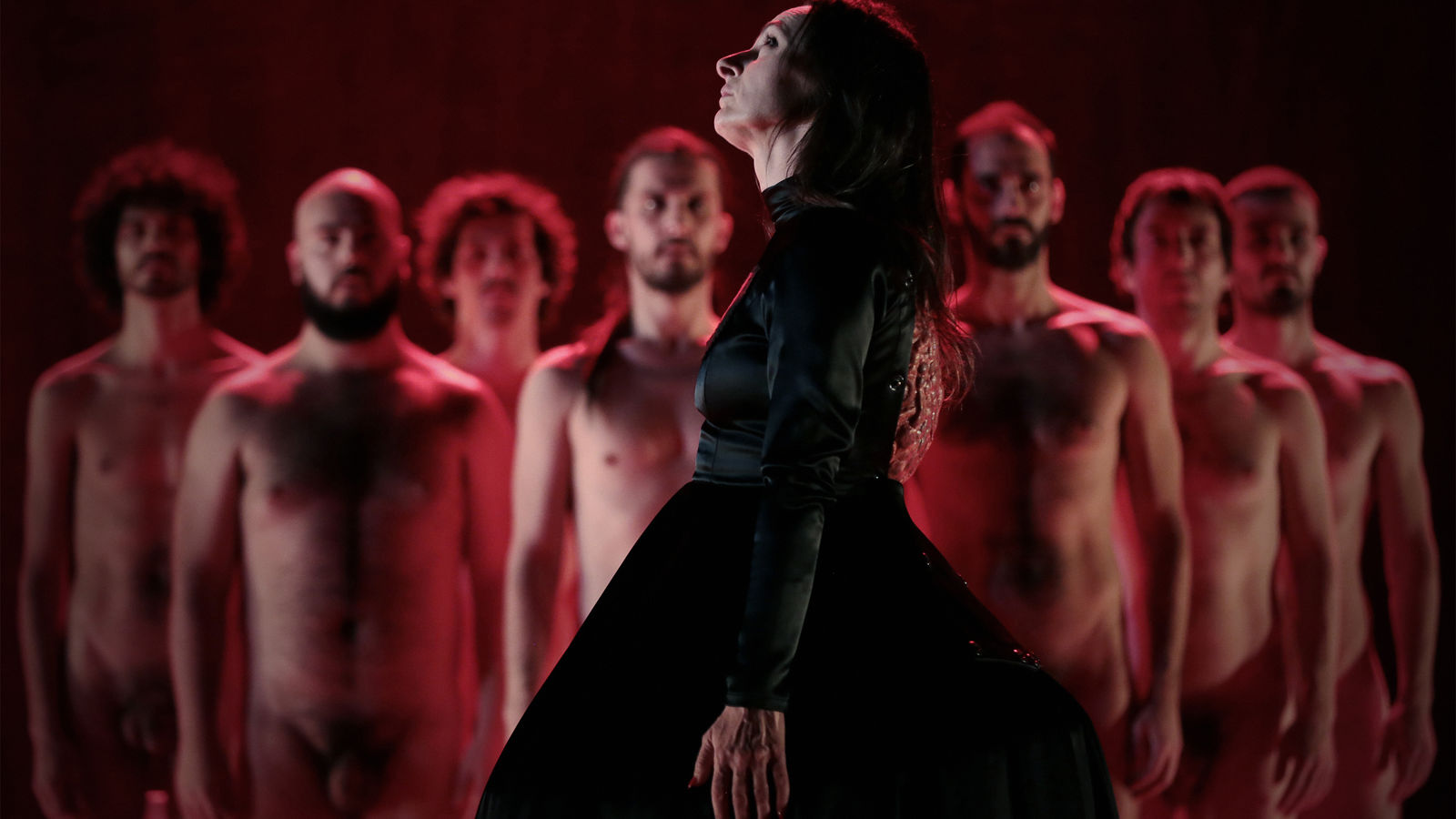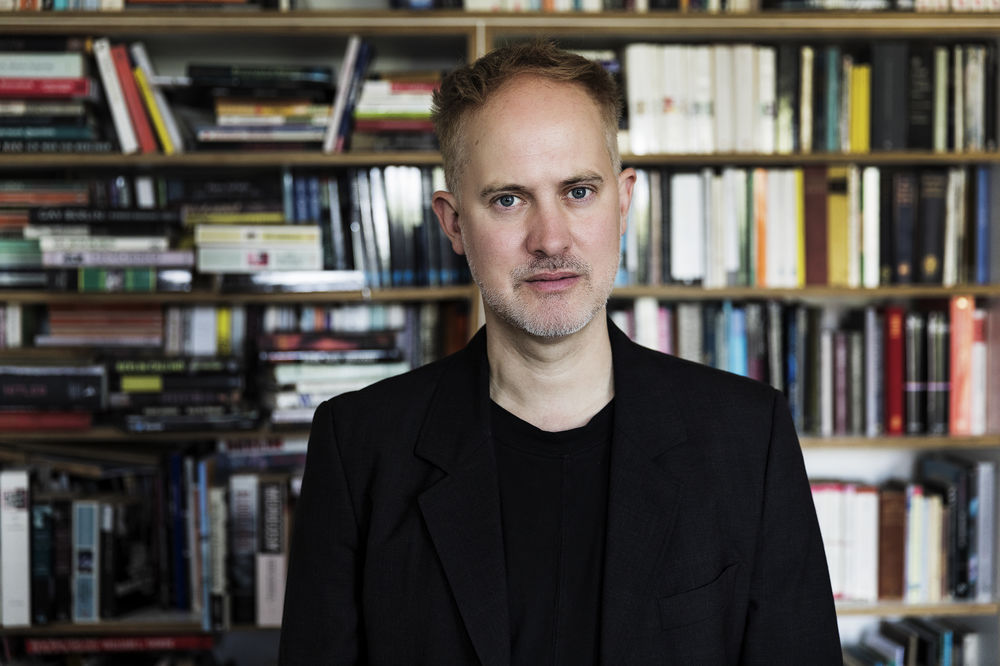
Marking Angélica Liddell with a (Scarlet) Letter
by Joseph Pearson
09. Oktober 2021
With which letter does the audience mark Angélica Liddell?
Drawing on the 1850 Nathaniel Hawthorne novel, her production »The Scarlet Letter« at FIND 2021 is about public castigation. Set in the Puritan 17th-century Massachusetts Bay Colony, the original text explores how an adulteress, with a child out of wedlock, is humiliated by a religious community and made to wear a red »A« for her crime.
Liddell is quick to see the parallels to a contemporary »A«: that for artists, not only misunderstood by the public and critics, but controlled by a system of taboos. The residue of such sensitivities (or, in Liddell’s view, totalitarianisms), was perhaps seen earlier this week in her performances of »Liebestod«, when it was only a matter of minutes before some members of the audience got up and left, as Liddell took a razor blade to her knees. Yes, there was a trigger warning. Many simply had a physical aversion to blood. But there were no doubt others who reacted with fury and censure.
This preview is an opportunity to speak more broadly to the audience of Liddell’s »The Scarlet Letter«. What letter would they have her wear? The »A« of the avant-garde? To find out, I meet them before and after the Schaubühne’s premiere.
The first person I speak to is the dramaturge Florian Borchmeyer, who tells me that he can’t reduce her to a letter. »My message would be Yo sí te quiero!«, in response to her »Liebestod« monologue about how nobody loves her.
Borchmeyer tells me that, »Liddell reflects in »The Scarlet Letter«, this 19th-century novel, and about this mark, because she observes a re-puritanisation of society. The world she crafts is also drawn from Ray Bradbury’s »Fahrenheit 451«, a world where books are banned. As far as letters go, she brings in other A’s: »Artaud«, »Althusser«. Out of this comes a dystopia. But it also a struggle for an ideal, and her concept of beauty and transcendence, but in a form that is not a totality, but one that – to my mind – is convulsive and fragmented«.
And I can’t help but think of singular letters torn from an alphabet or from whole words.
I find a seat at a table in the Schaubühne’s café with my computer, looking for a power outlet. Three women sit there before the show’s Berlin premiere eating fries and drinking beer. All of them saw »Liebestod« earlier in the week and were excited enough to come and experience the second artist in focus production. I ask each in turn what letter they’d give Liddell.
Mirando Berckmoute, 24 years, tells me she would choose »X, because it stands for something that we don’t really know if we can understand or touch. Like when you are on a treasure hunt. And X marks the spot but you don’t know what it is. X in mathematics is also the unknown variable«.
Judith, 34 years, from Spain, tells me, »I choose Y. First, because it resembles a crossroads. And because in Spanish it is called the »Greek I« [i griega], which creates an identity crisis for the letter«.
Lena, 25 years, from Berlin, meanwhile, chooses »C. Because she challenges the way I see myself, my role in society and the way theatre should be. The way I watch in this exact moment, the way I open up to new things, or close myself down and become dishonest«.
I approach one final spectator, as the bells ring for the start of the show, and crowds head towards their seats. Sebastian from New York, 39 years, tells me: »In my unkind moments, it’s M for masturbatory. But in my kind moments, E for exhilarating. Let’s see which one it will be!«
*
I don’t want to say too much about the production because it’s my job to write previews and not reviews! But I was interested to ask the audience whether their letter for Angélica Liddell stayed the same by the end of the evening.
I sit with my computer at the drinks party following the premiere and first catch up with Sebastian from New York, who is eating a Brezel. I ask him whether M or E won out during the production. He tells me, »I’ve seen a lot of Liddell performances and while I like her, I generally always feel this tension between admiration and resistance. I think the letters I chose are actually very appropriate for Liddell since together they spell the first-person pronoun: »me«. So, I choose both«.
I catch the attention of two handsome men passing the table. Isaac from Berlin, 45 years old, tells me, »I’d choose a Hebrew letter. There are five letters that have a different form when they appear at the end of a word in Hebrew [the »sofit«]. They are kind of rebellious letters. So, the final Hebrew P (ף) is what I’d choose. It’s non-conformist, it’s unusual, it doesn’t feature very often. I actually like the fact that it ends the word »end«. It’s like a full stop for a full stop. It’s unusual and indecent, like Liddell«.
His friend, Max from Brandenburg an der Havel, 33 years old, tells me, »I will take a Latin letter, a Z, because I like the sound it makes in German: »Tz« and the name I like too: »Tzed«. It’s sharp, it cuts your skin when you say it. This is how I felt tonight! In a good way, somehow. I feel weirdly alive«.
I also catch up with the women who were drinking beer and eating fries at the table earlier. Now they are on to prosecco. For Lena, it’s still C, for »being challenged«. Judith, however, has changed her mind. She tells, »I really thought about this in the moment, during the play. I change my letter to S for the semen planted in our retinas!«
But now, it’s time to get some wine. I fold up my laptop and run into a colleague, Lisa, who passes me a glass of bubbly and says, »I like G. Because you can write it in so many different ways, as either static or dynamic in your handwriting. At the same time, the sound is very impulsive, like a cry. Or the start of something. I always make a sound like that when I’m impulsively reacting towards something«.
»Did you want to cry out that letter a lot this evening?« I ask, smiling.
She laughs, »I did it silently in different ways: I was repelled but also drawn completely to the show«.
And we discuss how that double embrace is rather Angélica’s point.
‘And what letter would you give her?’ Lisa asks me, sounding curious.
I already know. The letter must remain the one she chose for herself.
The Scarlet Letter
(Madrid)
von Angélica Liddell
Regie: Angélica Liddell
Premiere war am 19. März 2020
Pearson’s Preview

Archiv
April 2023
FIND 2023
Nostalgisch, nicht sentimental
The Wooster Group als »Artist in Focus« an der Schaubühne
| Seite 1 von 10 Seiten |
